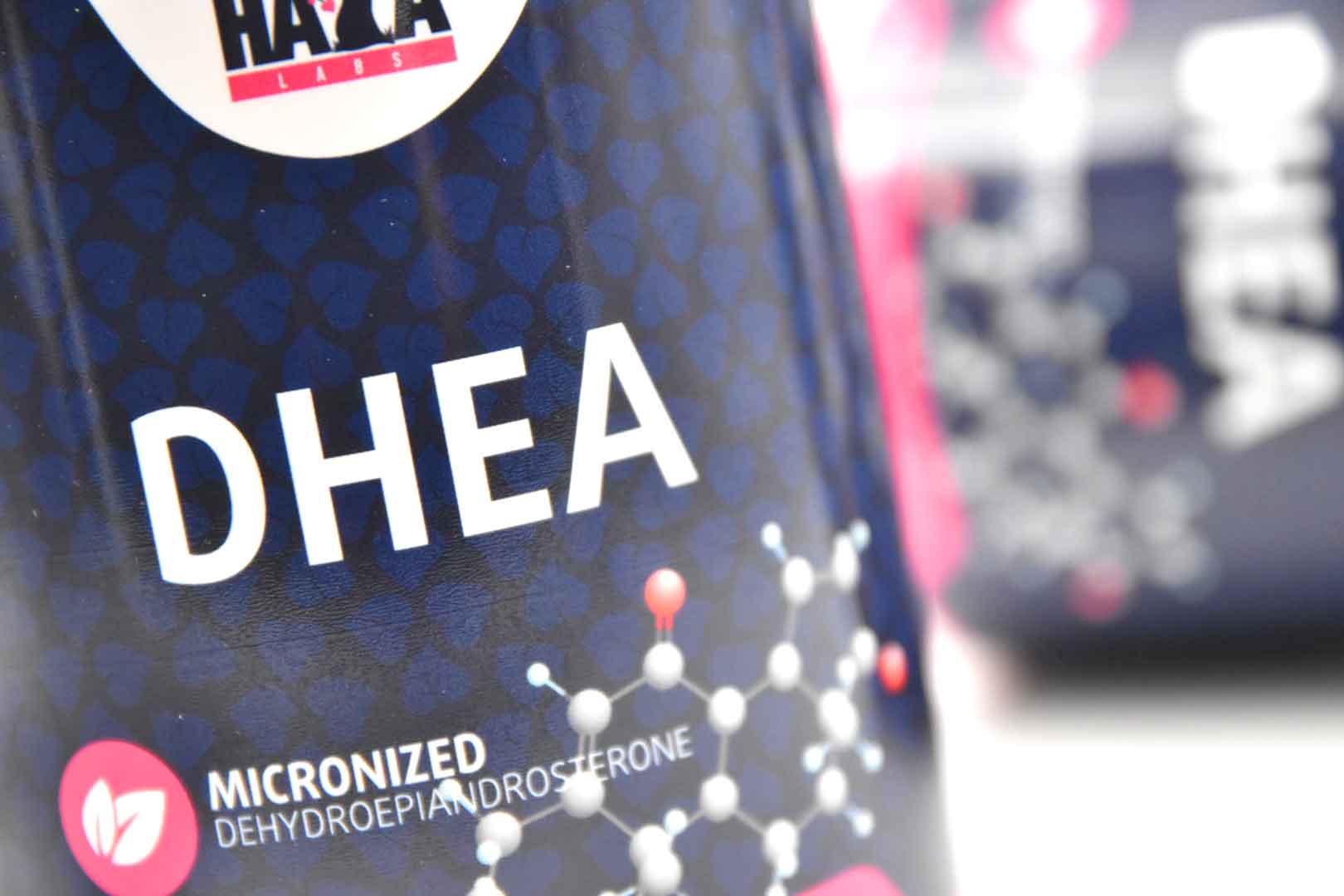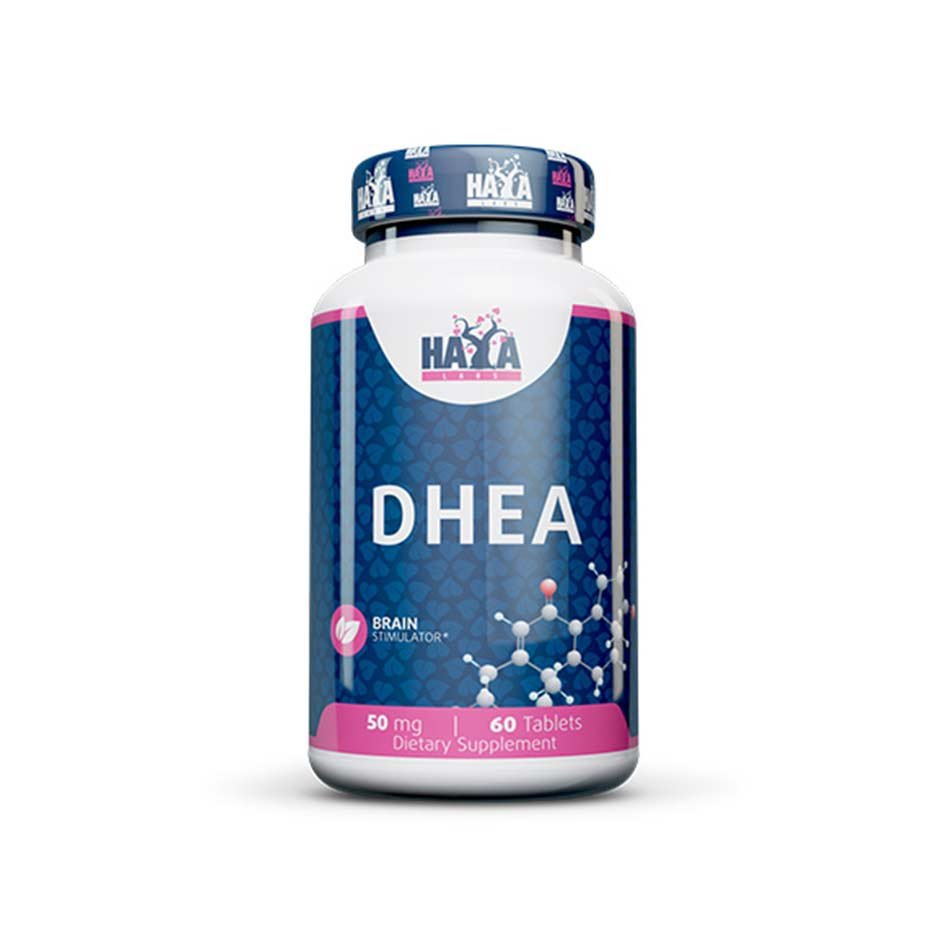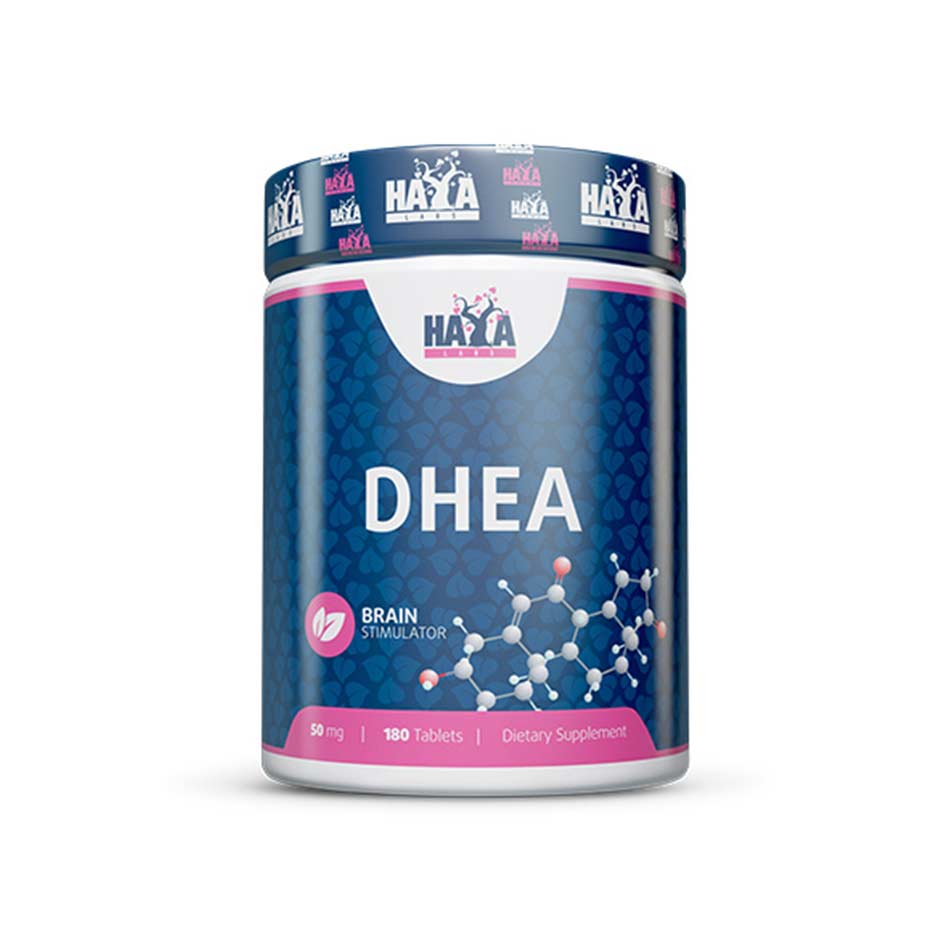
DHEA is a polarizing topic: Thousands of users, including fitness enthusiasts and others, swear by the hormone supplement, as do anti-aging clinics. On the other hand, there are many who advise against DHEA supplementation. One thing is certain: DHEA is an extremely popular dietary supplement in the USA. But what benefits does DHEA have in bodybuilding? Does DHEA have side effects? And is DHEA suitable for women? These and other questions are answered further down the page. If you want to buy DHEA, check it out first!
DHEA – the anti-aging hormone with recomposition effect
What is DHEA?
The letters "DHEA" stand for dehydroepiandrosterone or dehydroepiandrosterone acetate – a hormone produced by the adrenal glands that influences metabolism and the immune system. DHEA is also the prohormone for the sex hormones testosterone and estrogen. "Prohormone" means it is their precursor. Through several intermediate steps, it is first converted into testosterone and then – depending on the hormonal environment – into 17β-estradiol (i.e., estrogen) by aromatase.
Of all the steroid hormones in the human body, DHEA is the one that is produced in the greatest quantities. The body produces it throughout life, although the amount changes depending on age. Young children, for example, produce very little DHEA. The amount only increases from around the age of 7. With the onset of puberty around the age of 14 to 16, DHEA production then skyrockets until it reaches its maximum around the age of 20. From then on, it declines continuously. In 70-year-olds, DHEA production is only about 20% of that of 20-year-olds, although it is still slightly higher in men than in women.
Effect: How does DHEA work?
The hormone DHEA is said to have numerous positive effects, although only a small portion of these have been proven by studies. The problem with proving these effects is that, to date, no specific receptor for DHEA has been identified. Therefore, it is unclear to what extent the observed effects are due to DHEA itself or to the testosterone or estrogen into which DHEA is converted. But it doesn't really matter. The list of effects includes the following:
- Increase energy levels
- Promotes the development of muscle mass
- Promotes the breakdown of body fat
- Improvement of body composition (recomposition)
- Optimization of metabolism
- Support of the immune system
- Increased well-being
- Improvement of cognitive performance (memory performance and ability to concentrate)
- Increasing stress resilience
Due to its numerous potential effects and its proven androgenic and neurotropic properties (as a neurosteroid, it binds to GABA and sigma receptors), DHEA is an extremely promising substance. In addition to its use as an anti-aging agent, it is being considered for use in obesity, immune deficiency, and even cancer. It is also said to stabilize nerve cell growth, which is why its use in Alzheimer's patients is also being discussed [1].
DHEA for bodybuilders: What are the benefits?
For people who engage in strength training or bodybuilding, the effects of DHEA on muscle building and fat loss are of particular interest. "Improving body composition" also sounds appealing. But what are the studies on this, and what are the experiences of athletes with DHEA?
muscle building
DHEA actually promotes muscle building – this is scientifically proven. Several studies [2] have shown that DHEA therapy significantly promotes the increase in muscle mass and strength. However, this effect only occurs when heavy resistance training with weights is performed simultaneously [3]. Therefore, taking DHEA alone has no anabolic effect. (This is where DHEA differs from "real" anabolic steroids, which work even without training.) And: Apparently, only older people over 50 benefit from the anabolic effect.
Fat loss
DHEA promotes fat loss – but only in rats and mice. In any case, the fat loss effect has so far only been demonstrated in animal studies [4]. However, DHEA has shown a positive effect on body composition in human studies (see below).
Improvement of body composition (recomposition)
In healthy, non-obese men and women of advanced age (50–65 years), DHEA supplementation has been shown to have an impact on the muscle mass-to-fat ratio. A one-year study in which participants received DHEA for 6 months and a placebo for 6 months clearly demonstrated this [5]: The men, in particular, had a higher body weight and lower body fat percentage after the DHEA phase. They also had increased strength. The women also gained body mass; however, their body fat percentage did not decrease afterward.
DHEA is clearly quite suitable for enhancing training success in older athletes. This is also consistent with the DHEA experiences circulating online: With DHEA, users can achieve progress again, often after years of stagnation. However, doctors recommend taking DHEA only after thorough medical advice. According to the BfR, its use without a medical indication is generally not advisable.
DHEA for Women: Is Dehydroepiandrosterone Useful for Women?
Studies have shown that DHEA is not particularly effective for women in the context of bodybuilding and recomposition, but it is even more effective in the context of well-being. In a well-known study by Dr. Yen, 82% of women and 67% of men reported that they slept better, had more energy, and were better able to cope with stress with DHEA [6]. However, more recent studies have found that DHEA treatment does not significantly improve the quality of life of postmenopausal women [7].
DHEA as an anti-aging agent: Does DHEA have a rejuvenating effect?
It is highly likely that DHEA has an anti-aging effect – but so far there have been no large-scale clinical studies to prove this. The only evidence is that DHEA production decreases with age and that DHEA supplementation with oral preparations can lead to higher DHEA levels in both older and younger people. In the early 1990s, when DHEA first came onto the market as a supplement, there was a real hype surrounding this alleged anti-aging miracle cure. It was touted as a potency enhancer and as an anti-wrinkle and anti-hair loss agent, among other things, even though there was no evidence to support these effects. Accordingly, buyers of DHEA supplements were often disappointed. This led to DHEA gaining a rather negative image as an overrated supplement throughout the 2000s, until more recent studies suggested that the hormone exerts an immunomodulatory effect in older people, increasing the number of monocytes, T cells, and natural killer (NK) cells. This improves muscle strength and bone density. It may also counteract age-related skin sagging by stimulating the production of procollagen/sebum [8].
DHEA Side Effects: What side effects does DHEA have?
DHEA itself has no side effects – that's the good news. The bad news: Since DHEA is converted into sex hormones such as testosterone and estrogen, DHEA supplementation can lead to higher testosterone or estrogen levels, respectively, and this can then lead to undesirable effects. These then correspond to the side effects that can also occur with anabolic steroid abuse [9]. In men, these include:
- acne
- Breast enlargement (gynecomastia)
- Mood swings
- Unfavorable shift in blood lipid levels (HDL/LDL cholesterol)
- Acceleration of prostate growth
- Promotion of liver cancer
In women, possible side effects include:
- Increased hair growth
- Exacerbation of polycystic ovary syndrome (PCOS)
- Unfavorable shift in blood lipid levels (HDL/LDL cholesterol)
- Promotion of liver cancer
Whether these DHEA side effects occur depends essentially on the dose chosen (see below: DHEA dosage).
DHEA dosage: How should you dose DHEA?
If DHEA is to be used to raise levels in an older person to the level of a younger person, a daily dosage of 0.5 mg to 1 mg per kg of body weight is sufficient. Therefore, an 80 kg adult is well served with 50 to 75 mg per day. For women, doses of around 25 mg are usually sufficient, taken with a glass of water upon rising in the morning. Bodybuilders take 100 mg daily, which is also acceptable (especially since many bodybuilders weigh 100 kg). Higher doses are not recommended due to the risk of side effects.
Legal situation: Is DHEA legal?
Whether DHEA is legal depends on where—or in which country—you buy it. In the US, DHEA has been a legal dietary supplement since 1994 and is available in supermarkets and drugstores. However, due to the significant impact on hormonal balance that DHEA supplementation has, the US National Institutes of Health (NIH) has been advocating for some time that DHEA should be classified as a drug. This is intended to curb uncontrolled sales and unsupervised use.
In Germany, they are already one step ahead: DHEA is in theDrug Prescription Ordinance, Appendix 1, is listed as a prescription drug under the name "Prasterone." It is prescribed by physicians only for the treatment of menopausal symptoms (hot flashes, sweating, sleep disturbances, etc.) and after ovariectomy.
Furthermore, the consumption of DHEA is considered illegal in any case.Doping as defined by WADASince it is assumed that athletes can expect a significant increase in circulating testosterone and a consequent improvement in performance through the administration of exogenous DHEA, DHEA or dehydroepiandrosterone is on the WADA list of prohibited substances and methods.
Buy DHEA: Where can you order DHEA?
Because DHEA supplements are not available over the counter in Germany, offline purchase is only possible through pharmacies. Pharmacies can import DHEA-containing products on a doctor's prescription according to Section 73, Paragraph 3 of the German Medicines Act (AMG). The imported medicines are then not subject to government testing and are not subject to manufacturer liability. Alternatively, DHEA supplements can be obtained easily online.
Anyone who wants to buy DHEA should make sure that the product they choose actually contains DHEA—and not just plant extracts that only act similarly to DHEA or mimic its effects. Such products made from yam roots, taiga roots, or Siberian ginseng are often sold in online herbal shops and on the websites of naturopathic practices. You have to read the product descriptions very carefully to understand what you're actually getting.
- deutsche-apotheker-zeitung.de (2002): “Miracle cure”: DHEA – a hormone with diverse effects – DAZ 2002, No. 8
(https://www.deutsche-apotheker-zeitung.de/daz-az/2002/daz-8-2002/uid-5535) - L. Baker, S. Karan, AM Kenny (2011): “Effect of dehydroepiandrosterone on muscle strength and physical function in older adults: a systematic review” - J Am Geriatr Soc (https://pubmed.ncbi.nlm.nih.gov/21649617/)
- T. Villareal, JO Holloszy (2006): “DHEA enhances effects of weight training on muscle mass and strength in elderly women and men” – Am J Physiol
Endocrinol Metab. (https://pubmed.ncbi.nlm.nih.gov/16787962/) - J.-W. Ryu et al. (2003): “DHEA administration increases brown fat uncoupling protein 1 levels in obese OLETF rats” – Biochem Biophys Res Commun.
(https://pubmed.ncbi.nlm.nih.gov/12659879/) - AJ Morales et al. (1998): “The effect of six months treatment with a 100 mg daily dose of dehydroepiandrosterone (DHEA) on circulating sex steroids, body composition and muscle strength in age-advanced men and women” – Clin Endocrinol (Oxf.) (https://pubmed.ncbi.nlm.nih.gov/9876338/)
- SS Yen (2001): “Dehydroepiandrosterone sulfate and longevity: new clues for an old friend” – Proc Natl Acad Sci USA
(https://pubmed.ncbi.nlm.nih.gov/11459947/) - K. Sreekumaran Nair et al. (2006): “DHEA in Elderly Women and DHEA or Testosterone in Elderly Men – N Engl J Med”
(https://www.nejm.org/doi/full/10.1056/NEJMoa054629) - K. Rutkowski et al. (2014): “Dehydroepiandrosterone (DHEA): hypes and hopes” – Drugs (https://pubmed.ncbi.nlm.nih.gov/25022952/)
- msdmanuals.com (2024): Dehydroepiandrosterone (DHEA) (https://www.msdmanuals.com/dede/heim/spezialthemen/nahrungserg%C3%A4nzungsmittel-und-vitamine/dehydroepiandrosteron-dhea)







